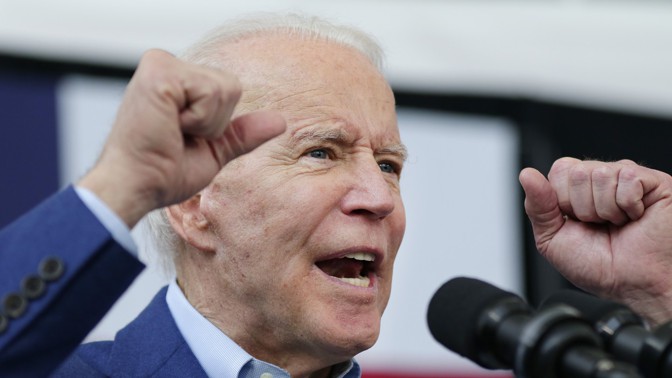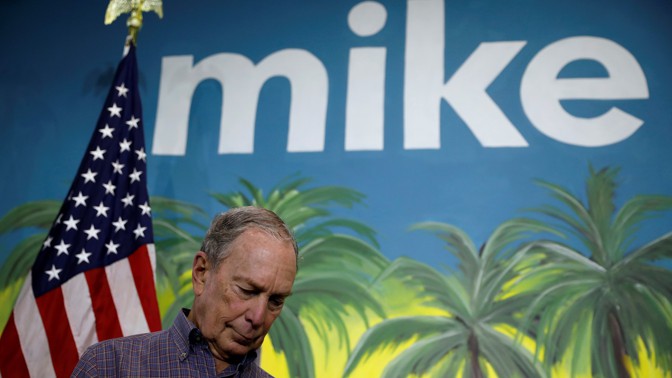It’s Wednesday, March 4. In today’s newsletter: Biden’s not only back from the wilderness—he’s a Democratic front-runner again. Plus: half a billion spent and zero states won.
*
« TODAY IN POLITICS »

(AP)
Call it a comeback.
Joe Biden couldn’t have dreamed it up better himself. A week ago, the former vice president seemed on the brink, possibly poised for an ignominious exit from the 2020 race.
The past few days—the past year, really, since he announced his candidacy—have been stocked with dizzying ups and downs for him:
May 2019: Biden got in a race later than most—and right away, he was crowned the front-runner.
June 2019: That little girl was me. At the very first Democratic debate, Senator Kamala Harris pummeled Joe Biden over his past support for busing—an early sign of his campaign’s wobbliness.
November 2019: In the fall, for a brief minute, Elizabeth Warren eclipsed Biden in the national polling average—cueing a freakout from moderate Democrats. In the smoke, Michael Bloomberg entered the race, and started shaking things up.
February 2020, Iowa Caucus: When Obama aides were dispatched to dissuade Biden from mounting a run in 2016, one told him this: “Do you really want it to end in a hotel room in Des Moines, coming in third to Bernie Sanders?” 2020 caucus night played out even worse for Biden. He came in fourth place, losing the type of working-class voters who were supposedly a big part of his base.
Biden was in such a bad position after Iowa that, as my colleague Edward-Isaac Dovere wrote at the time, it seemed like he might run out of money before Super Tuesday.
South Carolina: Biden not only beat his opponents in South Carolina, he routed them—a victory that sparked his comeback.
March 2020, Super Tuesday: Joe Biden was expected to have a better night—but in state after state, he performed a whole lot better than any polling whiz had anticipated. He even won Massachusetts, Warren’s home state where he barely had a campaign operation.
After South Carolina and a slew of Super Tuesday states broke his way, Biden’s not only back from the wilderness—he’s a Democratic front-runner again.
—Saahil Desai
*
« IDEAS AND ARGUMENTS »

(The Atlantic)
1. “It is hard to imagine a living arrangement more poorly suited to a COVID-19 outbreak than one in which large numbers of older people live in close proximity, eating and socializing in communal spaces.”
Seven Americans who’ve died from COVID-19 lived in the same nursing home in the Seattle area, where health officials are monitoring multiple other people. This kind of outbreak is exposing the frail position of long-term-care facilities, which will face an uniquely difficult task ahead, Joe Pinkser reports.
2. “The revolution would continue, with or without Bernie Sanders.”
That’s what Sanders supporters in Washington, D.C. told politics writer Elaine Godfrey after Sanders’s worse-than-expected performance on Super Tuesday. Here’s what else they’re thinking about going forward.
3. “Biden’s agenda is plenty bold.”
There is a large constituency for a racially inclusive form of social democracy that is not democratic socialism, Yascha Mounk argues.
Though Vice President Joe Biden’s detractors often call him a centrist, his policy program would significantly boost the income of poor Americans and curb abuses by the rich and powerful. Among other things, Biden has pledged a higher minimum wage, a big increase in Social Security benefits for the poorest Americans, more generous health subsidies, and strengthened union rights.
*
« EVENING READ »

(MARCO BELLO / REUTERS)
The Final Days of the Bloomberg Campaign
Mike Bloomberg called it quits today in the aftermath of a devastating finish on Super Tuesday. He won zero states, but picked up a few delegates after bypassing the first four early primary states and spending nearly $500 million on his presidential bid.
Our staff writer Edward-Isaac Dovere now asks: Was the final humiliation worth the money?
The Bloomberg campaign was putting together the kind of on-the-ground operations pitched to potential hires as “Think about getting to do everything you’ve ever wanted to in a campaign.” Then Biden won South Carolina, a single state that he was always expected to win (though he won by a margin larger than he had dared hope), and the chin-strokers and anti–Bernie Sanders panickers instantly transformed Biden into a juggernaut.
It was enough. By the time Bloomberg took his seat in the pew, his top aides and most prominent supporters had started to realize that the implosion of his campaign couldn’t be stopped.”
Bloomberg has put his weight behind Biden. What sort of influence do his billions wield now that the field has shifted?
*
Today’s newsletter was written by Saahil Desai, an editor on the Politics desk, and Christian Paz, a Politics fellow. It was edited by Shan Wang, who oversees newsletters.
You can reply directly to this newsletter with questions or comments, or send a note to politicsdaily@theatlantic.com.
Your support makes our journalism possible. Subscribe here.
from The Atlantic https://ift.tt/2uUaKJL







0 comments:
Post a Comment